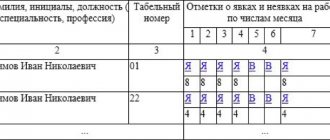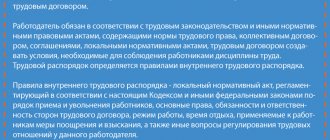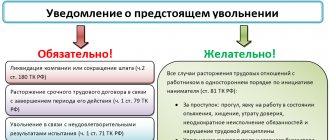Is it possible to shorten the working week at the initiative of the employer?
Yes. In the event of a change in technological or organizational working conditions, the employer unilaterally has the right to make changes to the employment contract with the employee (Article 74 of the Labor Code of the Russian Federation). At the same time, he is obliged to warn the employee about the upcoming changes 2 months before the planned introduction of the short-time regime.
If the employee does not agree with the proposed changes in work, the employer has the right to terminate the contract with him after 2 months due to staff reduction, paying all due compensation. If the employee agrees to the changes, the step-by-step procedure must be followed.
Step 1
2 months before the start of the reduction in working hours, notify the employee of the upcoming changes. This can be done either orally or in writing.
Step 2
Draw up an additional agreement to the employment contract, which states how the employee’s work schedule will change and how his work will be paid (we’ll talk about this in the next section).
The wording may be as follows: “...By agreement between the parties, the employee is established on a part-time working schedule:
- working hours - 32 hours per week;
- four-day work week with 3 days off - Saturday, Sunday and Monday;
- Duration of daily work - 8 hours;
- start time - 8:30, end time - 17:30;
- the break for rest and food is 1 hour from 12.30 to 13.30;
- The period of part-time work is set for the period from January 1, 2021 to March 1, 2020.”
This working mode can be established either without a time limit or for any period agreed upon between the employee and the employer (Article 93 of the Labor Code of the Russian Federation).
If there is a threat of mass layoffs (Part 5 of Article 74 of the Labor Code of the Russian Federation), then part-time work can be introduced as a temporary measure for a period of no more than 6 months.
Step 3
Issue an order to transfer the employee to reduced working hours:
Within 3 working days, send a written notification of the establishment of a part-time working regime at the initiative of the employer to the employment service. (Article 25 of the Law of April 19, 1991 No. 1032-1 “On Employment...”).
Employer initiative
Management may need to establish part-time work for various reasons.
Most often this is due to economic problems in the company, when the employer chooses to reduce working hours or fire part of the staff. The manager has the right to transfer subordinates to a different work schedule. The maximum period for such a change is 6 months. Since the introduction of a shortened working day is a change in the terms of the employment agreement, it is necessary to adhere to the rules. The manager's actions must not violate the rights of personnel or worsen the situation of employees. An example is the fact that when wages are reduced, they should not be less than the minimum wage.
How to pay for a shortened workweek
A shortened working week is paid in proportion to the time worked (Part 3 of Article 93 of the Labor Code of the Russian Federation). At the end of the month, it is necessary to calculate the cost of one hour of work in accordance with the monthly standard of hours and calculate the final amount of wages based on the number of hours worked.
Example
The employee has a 36-hour work week. There are 176 working hours in a month. He worked 144 hours. The employee's salary is 30 thousand rubles.
The payment calculation will be as follows: 30 thousand rubles. / 176 × 144 = 24,545.45 rubles.
A reduction in working hours is not a basis for reducing the salary established for an employee upon hiring. Pay your salary within the time limits established by law.
How to register a short pre-holiday day according to the Labor Code of the Russian Federation
According to Part 4 of Art. 91 every employer is required to organize reliable records of the time actually worked by staff. To do this, use a report card in the unified form T-12 or T-13 (Resolution No. 1 of 01/05/04) or you are allowed to create your own form, provided that all the required details are indicated in it. The days of reporting to the organization are o or “01”, and the number of hours worked on pre-holiday days according to the Labor Code of the Russian Federation is subject to reduction by an hour.
Should I issue an order or not? Since according to the Labor Code, pre-holiday days are regulated on a general basis, you don’t have to fill out such a document. If the employer decides to issue an order, it certainly won’t be superfluous, as will drawing up an announcement about the company’s work schedule. Our separate articles tell you how to do this. If the enterprise operates continuously, the list of those employees who will have to work without reductions in the duration of the work shift (day) should also be approved.
In cases where the employer does not comply with the current requirements of labor legislation, this is regarded as a violation. Responsibility for such actions is provided for in the Code of Administrative Offenses in the form of penalties. To avoid labor conflicts with personnel, it is recommended to respect the rights of employees and the rules of relations with them.
Conclusion - we looked at how the working day is shortened on pre-holiday days in accordance with the requirements of Russian labor legislation. Reduction of working hours is not made on weekends, except in cases of official transfer of Saturday or Sunday to working days.
Is it possible to establish a shortened working week during non-working days due to coronavirus?
Yes. In order to implement the decrees of the President of the Russian Federation on non-working days introduced due to the spread of coronavirus, working hours can be reduced by agreement of the parties.
If a part-time working day is established due to coronavirus, it is also necessary to conclude additional agreements with employees to employment contracts and draw up an order on reduced working hours. In the preamble to the order, refer to the Presidential Decree and/or the requirements of Rospotrebnadzor.
Since each region independently determines the date of resumption of work after quarantine, the end of the period of part-time work both in the order and in the additional agreement can be indicated by the wording “... until the introduction of the regime of daily activities.” This approach will allow you not to re-issue all the documentation.
Remuneration for workers with reduced working hours due to quarantine, as under normal conditions, is made in proportion to the time worked.
There are no reductions or reductions in salary due to coronavirus. When deciding to reduce your salary, be prepared for disputes with employees and inspections by labor workers.
Is it possible to shorten a day or week due to coronavirus?
Yes, an employer can reduce an employee’s working hours during an epidemic in order to maintain employment at the enterprise.
The President of the Russian Federation and the Government strongly recommend trying to retain workers even amid the coronavirus epidemic. Organizations in the affected industries are even offered to pay free financial assistance in the event of maximum retention of employment in the amount of 12,130 rubles. for each employee. The first payments will begin in May and will continue for three months.
Reducing working hours may be a solution for an enterprise that continues to operate during the quarantine period against the backdrop of declining customer interest and decreasing income.
The employer has a choice of how exactly to reduce working hours - reduce the number of hours of work each day or reduce the number of working days during the week.
The standard working time (Article 91 of the Labor Code of the Russian Federation) is a five-day (less often six-day) working week of 40 hours.
Most often, a five-day week is established, 8 hours each day. The duration of a week cannot exceed 40 working hours.
If an agreement is reached between the employee and the employer on the basis of Article 93 of the Labor Code of the Russian Federation, the specified normal working hours may be reduced. The reduction may be temporary or permanent. The length of the day (number of working hours) or week (number of working days) can be shortened.
For example, you can reduce working time by 2 times by setting a 4-hour day instead of an 8-hour day. Or instead of 5 days a week, work 3 days a week.
In the context of coronavirus, a decision on a shortened day or week can be made as soon as possible with the consent of both parties to the employment relationship.
Also, the employer can initiate changes on his own initiative, according to Article 74 of the Labor Code of the Russian Federation, by warning the employee 2 months in advance. However, this is not rational during the coronavirus epidemic, when you need to act immediately. The only way out for quickly making a decision to reduce working hours in the current conditions is the employee’s voluntary agreement to change.
Part-time work or a week during the coronavirus period can be very convenient in order to minimize contact among staff. For example, you can transfer some employees to work before lunch, and the second part - after lunch. Or organize work for different groups of workers on different days of the week. Such actions will be an integral part of measures to prevent the spread of coronavirus within the organization.
Which categories of employees have the right to demand a reduction in working hours?
The employer is obliged to establish part-time working hours after receiving an application from the following employees (Article 93 of the Labor Code of the Russian Federation, 256 of the Labor Code of the Russian Federation):
- pregnant employees;
- women, other relatives or guardians on parental leave;
- parent of a child under 14 years of age or a disabled child under 18 years of age;
- persons raising children under 14 years of age without a mother or a disabled child under 18 years of age;
- workers caring for sick family members in accordance with a medical report.
Part-time working hours for these categories of employees are established for a period convenient for them, in accordance with their wishes and taking into account the working conditions of each specific employer. However, such a period should not exceed the period of existence of circumstances that are the basis for the mandatory establishment of part-time work.
In addition, reduced working hours, due to compliance with the norms of the Labor Code of the Russian Federation, should be established for the following categories of workers:
| No more than hours per week | To the employee | Norm of the Labor Code of the Russian Federation |
| 24 | under 16 years of age | Art. 92 Labor Code of the Russian Federation |
| 12 | under the age of 16, if during the academic year he combines work with obtaining general or secondary vocational education | |
| 35 | aged 16 to 18 years | |
| 17.5 | aged 16 to 18 years, if such employees combine work with education | |
| 35 | disabled person of 1st or 2nd group | |
| 36 | employed in hazardous working conditions of the 3rd or 4th degree or working in hazardous conditions | |
| 39 | medical workers | Art. 350 Labor Code of the Russian Federation |
| 36 | women working in rural areas or in the Far North and equivalent areas | Art. 263.1, 320 Labor Code of the Russian Federation |
Question of price
Since the beginning of the year, the minimum wage in the Russian Federation has been equated to the subsistence level and increased to 11,280 rubles, and the real income of citizens (minus taxes and mandatory payments) averages 30,000 rubles, as calculated by Rosstat. And in order to live well, Russians want to receive from 45,000 to 120,000 rubles monthly.
Quite normal desires, considering that in many countries, people earn more by working less or the same amount. For example, the average monthly salary of the Swiss is 3,855 euros (about 285,000 rubles), but they work the same 40 hours a week. The situation is approximately the same in Chile. The standard working hours are the same as in Russia, but the average wage is much higher - 1,180 euros per month (about 87,000 rubles). The latest example is Korea. People work in this country 100 hours more per year, but receive 2,100 euros (about 155,000 rubles).
If we compare countries only by standard working hours, then workers from Germany (they work 1,363 hours), Denmark (1,410 hours), Norway (1,424 hours), the Netherlands (1,435 hours) and France (1,472 hours) do best. And salaries in these countries are also quite high - from 2,465 to 3,781 euros.
Payment to employees during a shortened work week by force of law
Payment for such categories of employees differs from the payment procedure for employees whose workweek is reduced by agreement with the employer. If an employee’s working hours are reduced by force of law, then pay wages as for full working hours: the establishment of shortened working hours does not entail a reduction in wages.
An exception is workers under 18 years of age. As a rule, they are paid wages for the time actually worked or depending on output. However, it is important to check industry agreements as they may include an obligation to make additional payments up to full salary. For example, full payment is provided for minor employees of housing and communal services organizations (clause 6.8.4 of the Industry Tariff Agreement in Housing and Communal Services, approved by the All-Russian Industry Association of Employers on December 8, 2016).
Part-time work
Working time is the time that staff spends on performing professional duties. Its duration at the enterprise is established according to production needs and is fixed by local acts.
However, the Labor Code of the Russian Federation does not explain part-time work, so if necessary, you should refer to other regulations. Such a document is the Convention of the International Labor Organization. It says that part-time work is a period whose duration is less than the previously established norm.
When introducing part-time work, one of the following modes can be used:
- reduction of working hours;
- reduction of the working week;
- shortened shifts with shortened weeks.
There are several categories of workers who can work part-time or a week. This is considered a full standard of work. We are talking about minors, disabled people, pregnant women, etc.
What risks might there be?
If you do not reduce the working week for employees who are required to do so by law, you face liability under Art. 5.27 Code of Administrative Offenses of the Russian Federation:
- from 1 to 5 thousand rubles. — officials or individual entrepreneurs;
- from 30 to 50 thousand rubles. - legal entities.
If reduced working hours are not established for women working in the Far North or in rural areas, they will have to pay for overtime work as overtime - at double the rate (clause 13 of the Resolution of the Plenum of the Supreme Court of January 28, 2014 No. 1).
If the conditions for reduced or part-time working hours are not specified or incorrectly reflected in the employment contract, the State Labor Inspectorate may bring administrative liability under clauses 4 and 5 of Art. 5.27 Code of Administrative Offenses:
- from 10 to 20 thousand rubles. — officials or individual entrepreneurs;
- from 50 to 100 thousand rubles. - legal entity.
Let's sum it up
- Establishing a shortened working week at the initiative of the employer is allowed only if a change in organizational or technological working conditions may lead to mass layoffs of workers.
- A reduction in working hours due to the coronavirus pandemic can be carried out by agreement of the parties. This solution involves reducing the cost of wages to employees, since in this case the salary is calculated in proportion to the time worked. However, this does not apply to those employees who are required to have their working hours reduced by law.
Source
KA "Personnel Method" is a recruitment agency in Moscow for fast and effective search and selection of personnel in Moscow and Russia. Our recruitment agency will provide recruiting services for the personnel you need. We are looking for and selecting top personnel (top managers, directors, senior managers), middle management personnel, IT specialists, sales managers, line personnel, accountants, doctors, stylists, ... We offer for Moscow and the Moscow region - mass recruitment of personnel - the cost is discussed separately . We provide guarantees for the personnel selected by our agency. Information for employers on personnel search and selection services can be found on this page . On the “Promotions” page you can find out about our latest promotions and special offers on personnel recruitment for Customers (employers). On the job description catalog page, read what the job description should be and download the basic options. We will search for employees and search for workers for you in a short time. For your convenience, we have created a section “Recruitment by profession” in which we have posted detailed information on the main positions of popular applications from Search and Selection Customers, but linked to a specific job title, for example, secretary, sales manager, merchandise manager, remote sales manager sales, purchasing manager, top personnel, managers, etc., as well as the section “Search and selection (recruiting) of personnel by specialization.” We also have a personnel selection service at a fixed cost!
Shorten the working week, do not reduce wages
Speaking at the International Labor Conference 2021, Prime Minister Dmitry Medvedev did not rule out that the transition to a 4-day working week will occur in the near future.
This will become possible thanks to technological progress, the development of artificial intelligence and other modern scientific and technical achievements. Continuing the topic, Deputy Prime Minister Tatyana Golikova carefully reminded that such a reduction should not affect social guarantees and wages, so that the question would not be raised whether May holidays or some other holidays are paid with the salary. It is difficult to say whether entrepreneurs are ready for such a reform. The proposal to clarify the concept of “working week” provoked active discussion among officials, deputies, and experts. The head of the Social Policy Committee, Valery Ryazansky, is confident that the idea deserves attention, since the transition to a four-day working week in Russia will allow working citizens to relax more, spend time with their families, and devote themselves to hobbies. The head of the Commission of the Human Rights Council under the President on labor and pension issues, Boris Kravchenko, the head of the State Duma Committee on Labor and Social Policy, Yaroslav Nilov, and a member of the State Duma Committee on Health Protection, psychiatrist Boris Mendelevich, publicly agreed with the senator.
At the same time, there are officials who do not see anything useful in this idea. According to Vladimir Khmelev, deputy of the Legislative Assembly of the Primorsky Territory, shortening the working week in Russia is another way to cut costs. And if the income of the population decreases, this will not lead to anything good. People will have to work harder than they do now to survive. As a result, the people's choice considers the option of shortening the working week to be a stupid and economically unjustified idea.









